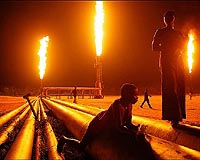 |
Caracas, Venezuela (UPI) Jun 26, 2009 Venezuelan Oil Minister Rafael Ramirez' announcement that the state will borrow more money to help pay off national oil company debts follows the disclosure by President Hugo Chavez of a letter urging Moscow to cooperate in selling oil at $100 a barrel. State petroleum company Petroleos de Venezuela has run up billions of dollars in debts to contractors since global oil prices began tumbling nearly a year ago. Although denying that PDVSA had cash-flow problems, Ramirez said that outstanding debts to contractors, both domestic and foreign, stood at $5.6 billion. That figure is far short of PDVSA's previous reckoning of $12 billion in financial debt last year. The minister said he would try to raise money by selling domestic bonds to finance public spending. He gave no details when the sale would take place or how much debt would be taken on. But his announcement is in line with a government plan outlined in March to sell almost $16 billion worth of new bonds this year. And a law was passed in May permitting PDVSA, which he heads, to pay debts with bonds rather than cash, and to compensate assets at book value. The state-owned oil company now insists that the drop in prices means oil companies are charging too much and it wants to renegotiate what it now refers to as "overvalued contracts." Oil firms should take a 40 percent cut in their bills, Ramirez insists. In May the Venezuelan military seized some 30 oil terminals and 300 boats belonging to 60 oil service companies. Chavez said that the oil industry rightly belongs to the nation and its people. Oil producers have protested, with some taking Venezuela to international arbitration or suspending operations until the bills are paid. The national oil company says it needs to reduce expenses by 60 percent, due to the low price of oil, which stood at around $70 a barrel on the New York Mercantile Exchange Friday. That figure is more than 50 percent below last year's peak of $147 a barrel in July. In an attempt to boost the price of crude, the Organization of Petroleum Exporting Countries has kept output low since it slashed production last September. Mexico and Russia are selling less oil to assist the cartel. And like OPEC, Venezuela continues to almost totally depend on oil revenue, which provides 93 percent of its export revenue. Chavez said he sent Russian President Dmitry Medvedev a letter last week urging that "big oil-producing countries unite" to raise oil prices to $100 a barrel. The letter was taken by Venezuelan Vice President Ramon Carrizalez, who visited Moscow last Monday.
Share This Article With Planet Earth
Related Links Powering The World in the 21st Century at Energy-Daily.com
 Russia horns in on China in Africa
Russia horns in on China in AfricaAbuja, Nigeria (UPI) Jun 25, 2009 Russian President Dmitry Medvedev's visit this week to Nigeria, sub-Saharan Africa's biggest oil producer, to sign natural gas deals threw down the gauntlet to energy-hungry China, which has been aggressively sinking its commercial hooks in the mineral-rich continent for the last few years. Medvedev is the first Russian president ever to visit Africa, underlining the importance Russia ... read more |
|
| The content herein, unless otherwise known to be public domain, are Copyright 1995-2009 - SpaceDaily. AFP and UPI Wire Stories are copyright Agence France-Presse and United Press International. ESA Portal Reports are copyright European Space Agency. All NASA sourced material is public domain. Additional copyrights may apply in whole or part to other bona fide parties. Advertising does not imply endorsement,agreement or approval of any opinions, statements or information provided by SpaceDaily on any Web page published or hosted by SpaceDaily. Privacy Statement |